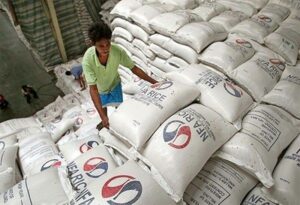
NFA sale of rice stocks needs further scrutiny, says House panel chair
THE NATIONAL Food Authority’s (NFA) claim that no irregularities happened in its sale of rice buffer stocks should be scrutinized further by the House Agriculture Committee, Quezon Rep. Wilfrido Mark M. Enverga said over the weekend.
Mr. Enverga, the panel chairman, said NFA Administrator Roderico R. Bioco’s explanation that the agency’s disposition of rice stocks need not undergo regular bidding processes exposed gaps that should be investigated further.
“Upon questioning, NFA Administrator Bioco could not justify which mode allows him to sell to traders under Commission of Audit (CoA) memorandum circular 89-296,” the lawmaker told BusinessWorld in a Viber message. “Even the NFA council resolution on warehousing does not allow him to do the same.”
The NFA’s alleged improper sale of rice buffer stocks prompted the House panel to scrutinize the sale of some “75,000 bags” of “aging and deteriorating” rice to private rice traders as it did not seem to follow proper guidelines.
Mr. Bioco earlier said that NFA’s sale of rice stocks does not require bidding as it is exempted from procurement law “because this is a regular function of (aging rice) disposal.”
However, Mr. Enverga said the panel should scrutinize the alleged exemption of rice stock disposal from public auction in the interest of transparency and public fairness.
“Director Bioco’s statement on skipping public bidding for aging rice disposal needs scrutiny,” he said. “Transparency and fairness are vital, even for routine functions. Any deviations should be justified and closely monitored.”
Federation of Free Farmers National Manager Raul Q. Montemayor said they view NFA’s sale as anomalous because the rice buffer stocks sold to private traders were allegedly worth much more “than the negotiated P25 per kilo (of rice) selling point” in the public market.
“Instead of the government benefitting from the rice products, it was private rice traders who reaped and made profit from the selling of aging rice,” Samahang Industriya ng Agrikultura Executive Director Jayson H. Cainglet, speaking in Filipino, told BusinessWorld in a phone call.
Mr. Cainglet observed that rice traders made significant profits from the lopsided rice deal as private retailers allegedly sold NFA-milled rice at P52 per kilo.
“Palay was bought at P25, but because you expended manpower to mill the rice, the total expenses by the government rose to P38 to P39 per kilo of rice,” he said. “It was sold at P25 to rice retailers, which they would then sell at P52 per kilo to the public.”
Mr. Montemayor said that Mr. Bioco’s statement that the NFA released “aging and deteriorating” rice buffer stocks must be “verified through laboratory analysis.”
“NFA was also supposed to release aging stocks on a ‘first-in-first-out’ basis so buyers would get the oldest stocks first,” he said. “There have been reports in the past of the sale of supposedly aging stocks which were actually just newly milled (rice stocks).”— Kenneth Christiane L. Basilio



